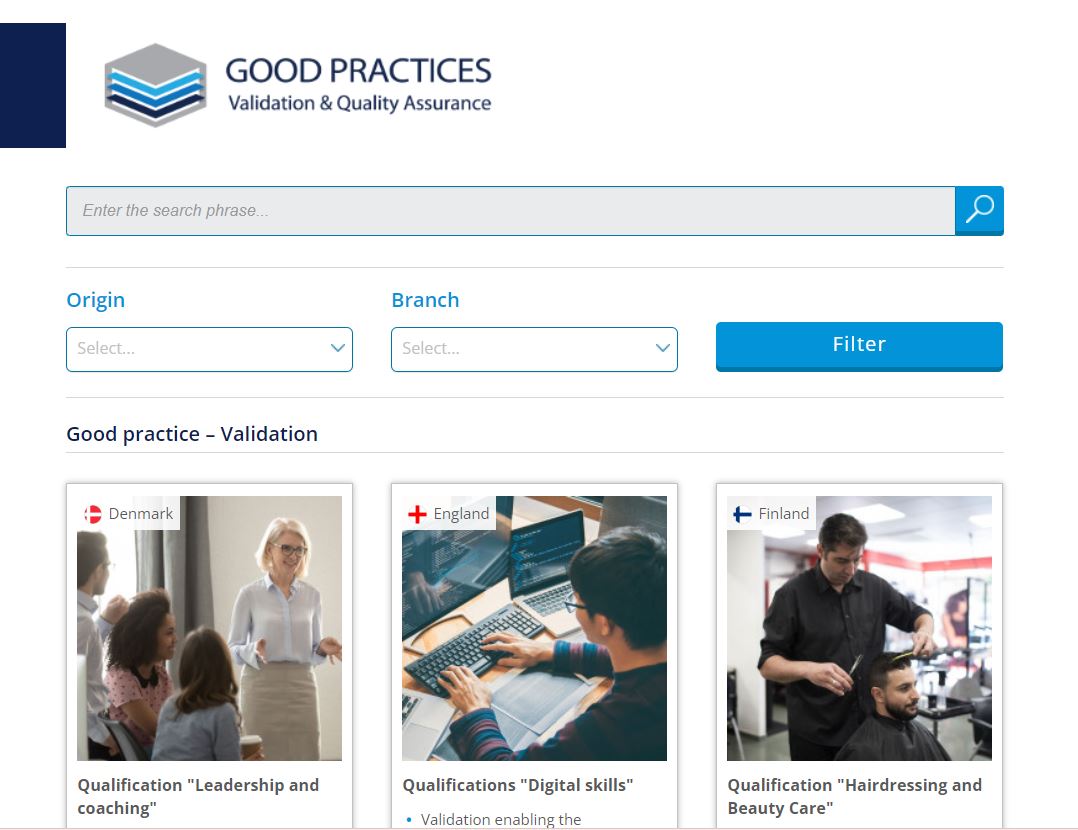
The validation of learning outcomes is an essential mechanism in the Integrated Qualifications System. Only a positive validation result leads to having a certificate awarded that confirms the attainment of a given qualification.
Validation may consist of three stages: identification, documentation and assessment of the learning outcomes. It is a comprehensive approach which can be used not only to attain a qualification but also to broadly diagnose the learning outcomes a given person has. This process is performed in the IQS by institutions that have obtained formal authorisation to certify qualifications - the so-called awarding bodies.
The quality of IQS qualifications depends, among others, on whether validation is credibly performed, i.e. in an accurate, reliable and relevant way. The credibility of the validation process performed by awarding bodies is ensured by the so-called external quality assurance entities, which have the important task of evaluating the qualifications awarding process in these bodies.
Experts of the Educational Research Institute in Warsaw have prepared a package of online tools useful at all stages of validation, both for people interested in confirming their competencies, as well as for institutions contributing to the IQS: the Catalogue of Validation Methods (described in IQS Newsletter no. 2), My Portfolio (described in IQS Newsletter no. 3), and the Good Practices Database: Validation & Quality Assurance.
What is the Good Practices Database?
The Good Practices Database was created as part of the project “Support to central government administration, awarding bodies and quality assurance institutions in implementing stage I of the Integrated Qualifications System” implemented by the Educational Research Institute on behalf of the Ministry of National Education.
The GPD is an on-line repository containing examples of:
- performing the validation of learning outcomes – validation is understood as the process of confirming that a person possesses knowledge, skills and social competencies, regardless of how they have been acquired, often based on national qualifications frameworks and descriptions of qualifications presented in the language of learning outcomes;
- ensuring the quality of awarding qualifications – quality assurance is understood as the use of systemic solutions (e.g. cyclical evaluation) to continuously improve the process of awarding diplomas or certificates.
How did we obtain and select the good practices?
The examples of sources in the Database are the expert studies obtained from specialists in the field of validation of learning outcomes from Poland and abroad. These examples were selected to illustrate the following aspects of the process:
- division into the three stages of validation (identification, documentation and assessment of learning outcomes) and certification;
- support provided to individuals undergoing the validation process, including counselling;
- diverse methods used in validation, including non-traditional methods, such as the analysis of evidence and statements (the portfolio method);
- various validation results, such as obtaining a qualification, being admitted to an educational programme, broad identification of a person’s competencies.
Who are the users?
Originally, the Database was addressed to entities functioning in the Integrated Qualifications System (IQS) or planning to do so, which include: awarding bodies, entities applying for inclusion of the qualifications in the IQS, and the external quality assurance entities.
However, it quickly turned out that the GPD became a valuable source of information for trainers, examiners, educational and vocational counsellors, business owners in the field of education & training, as well as researchers.
What will you find in the Database?
- Polish and foreign examples of validation carried out in a specific company or institution; examples from Europe and from non-EU countries;
- step-by-step information about the consequent stages of validation;
- practical descriptions of validation methods and ways of applying them;
- characteristics of the competences and scope of responsibilities of the staff conducting the validation: counsellors, assessors, etc.
The examples presented contain comprehensive descriptions of the validation process performed by a specific institution offering a particular qualification or providing the entire quality assurance system. This allows the solutions to be presented in the broad context in which they function, so that the reader can independently assess whether and under what conditions they can be applied in his/her own context.
How can you use the Database?
Each good practice in validation has an interactive validation diagram that shows in a simple way how the process of confirming the qualification was designed. The diagram is also a navigation tool: clicking on an element of the process takes the reader to the relevant part of the text.
The good practices in quality assurance include infographics that present a synthesis of the most important elements of the given quality assurance system.
The user can simply browse the library of 23 good practices or to apply filters and search good practices by country, branch or industry, or using a phrase.
All the materials available in the Good Practices Database can be downloaded in pdf format.
What are the benefits?
By browsing the Good Practices Database you can:
- find inspiration when designing validation in your institution;
- refer to the source of examples of how to conduct the quality assurance of the validation process;
- learn about ready-to-use solutions that have proven successful in other countries - you will get help with determining the validation requirements.
What is next?
The website is still being developed. By the end of 2022 four new good practices will be added to the database. Moreover, some of the functionalities will be upgraded and improved.
Author:
Barbara Fijałkowska - Validation expert and TRANSVAL-EU project manager in Poland, Educational Research Institute


